Finding Seed Keywords
The SEO Keyword Research Master Guide - Chapter 1
Starting with seed keywords
Last Updated: May 25, 2021
Before beginning any keyword research process, you need a starting point. Or several starting points. These are your "seed keywords."
Your seed keywords are used to grow the list that will become your keyword strategy.
When coming up with seed keywords, you often start with your best guess. Here are questions you can ask yourself to help you brainstorm:
- What's my website about?
- What do I sell?
- What keywords do I think I want to rank for?
- What keyword ads would I buy?
- If someone were just beginning to research the topic of my site, what words would they use to start?
Write your answers down. You're going to use them really soon.
Getting specific
When choosing seed keywords, it often helps to get specific. If you run a motorcycle shop in Ohio, you might think "motorcycle" would be a great keyword, but in reality, it's so broad and so competitive it likely wouldn't do you any good. Instead, try being more specific.
Poor seed keyword: motorcycle
Good seed keywords: motorcycle repair manuals, used motorcycle parts
Seed keywords for existing sites
If you have an existing website, a powerful place to find seed keywords is uncovering keyword phrases you already rank for. These are phrases Google already finds relevant to your website, and you're going to have an easier time ranking for phrases related to these seeds.
Note: If you are building a new website and/or don't have any ranking keywords yet, see the section on seed keyword for brand new sites and topics.
There are two quick ways to find seed keywords you already rank for.
1. Seed keywords via Keyword Explorer
One of the more powerful uses of Keyword Explorer is its ability to show you the ranking keywords for any website, including your own.
- Navigate to the Ranking Keywords report
- Choose "root domain" (or subdomain/exact URL, depending on your needs)
- Enter your website or URL
- Select keywords ranking #4-20 (adjust this based on your preferences)
- By default, the United States market is selected, but Keyword Explorer also supports the UK, Canada, and Australia
- Hit "Analyze"
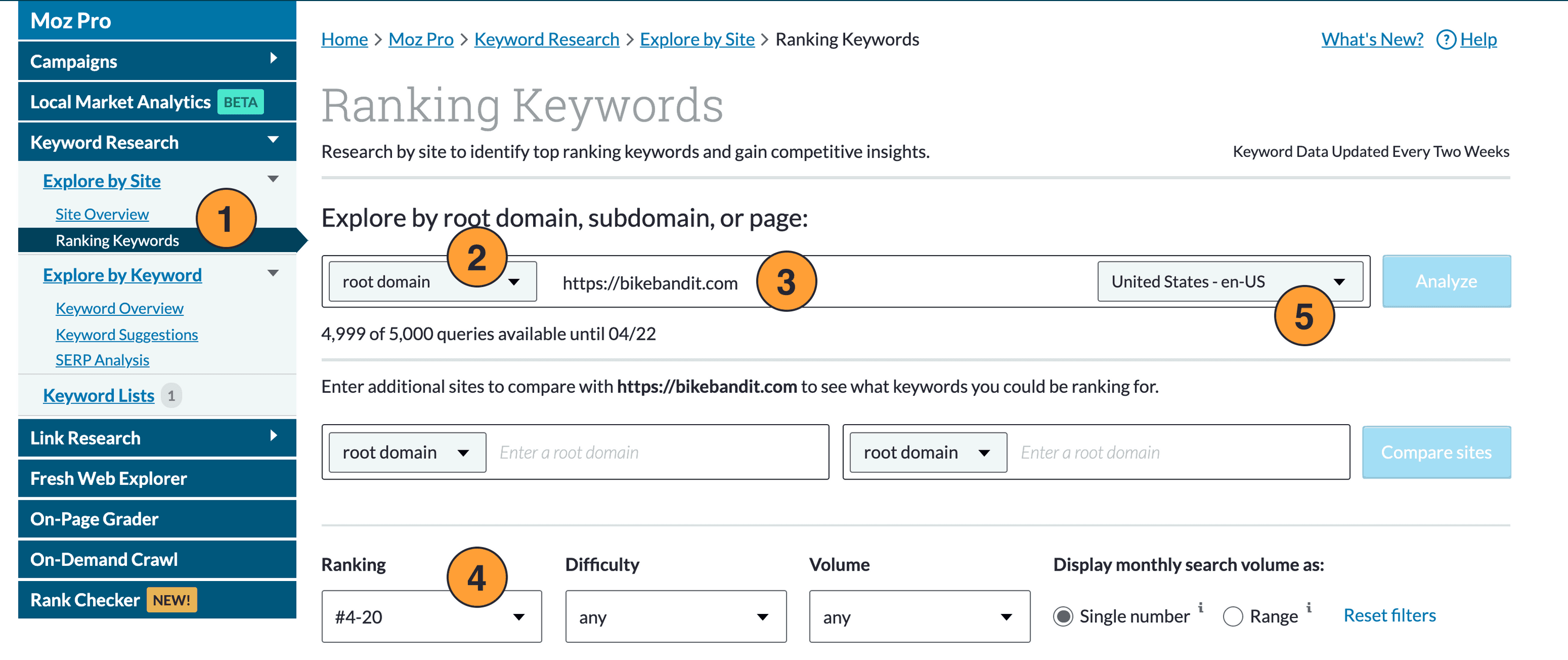
When you get results, the next part is very important: Sort the results by "Monthly Volume" (highest to lowest).
In this example, we used a site that sells motorcycle parts. Now we can select high-volume, ranking seed keywords that are most relevant to the website.
Note that we selected keyword phrases ranking #4-20, meaning we're filtering out keywords we already rank highly for. It's fine to adjust this filter to any setting you want. By using this process, we hope to find seed keywords:
- with a good amount of search volume
- that are relevant to our site
- that we don't already rank highly for
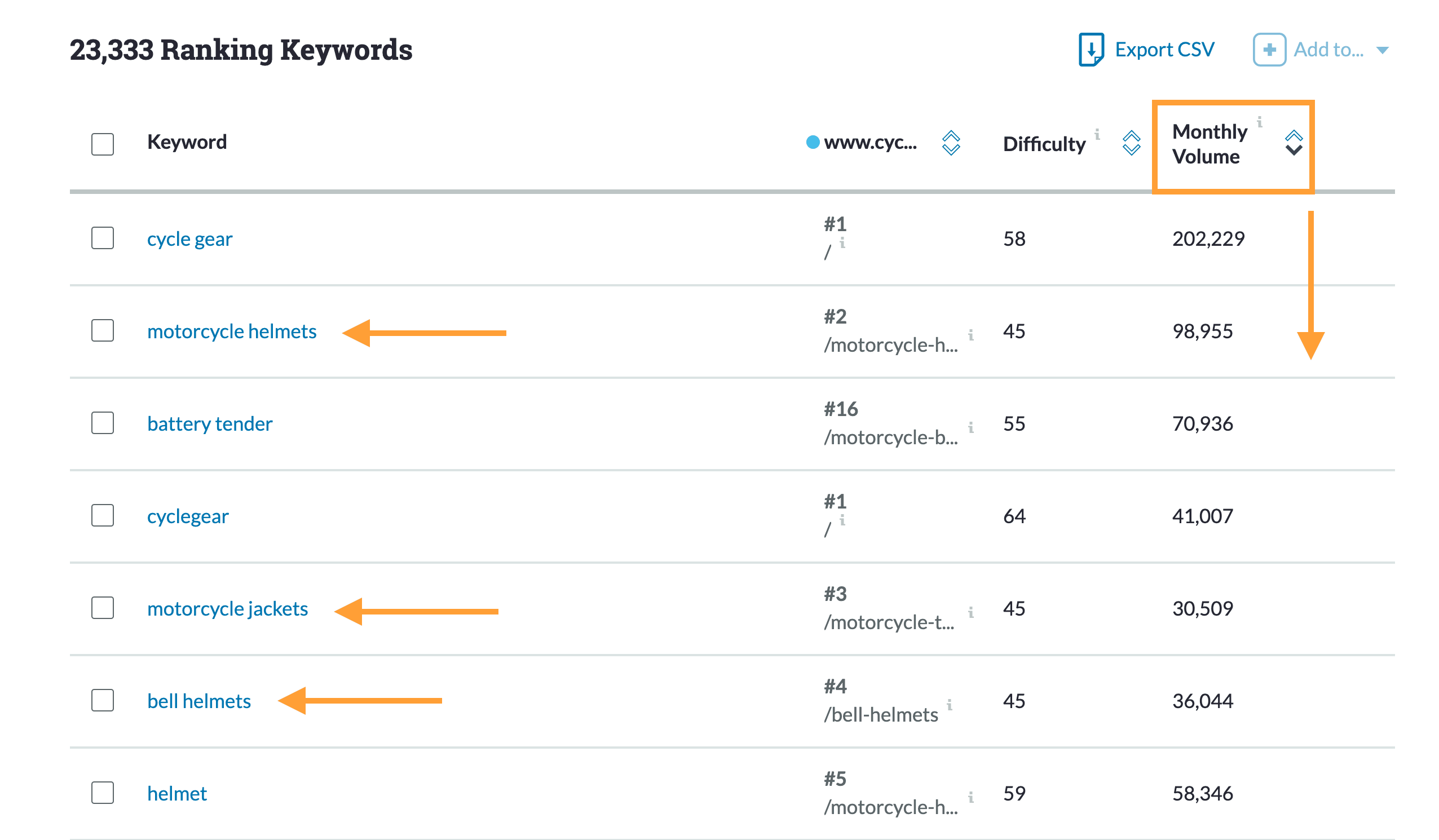
In this case, we found terrific seed words like "motorcycle accessories" and "bell helmets." We also want to ignore ranking keywords that may be irrelevant to our business such as "arai helmets" (assuming we don't sell them).
2. Seed keywords via Google Search Console
You can also find your ranking keywords in Google Search Console. Simply navigate to the Performance Report to view all your ranking queries.
Here are some top-ranking seed keywords for Moz.
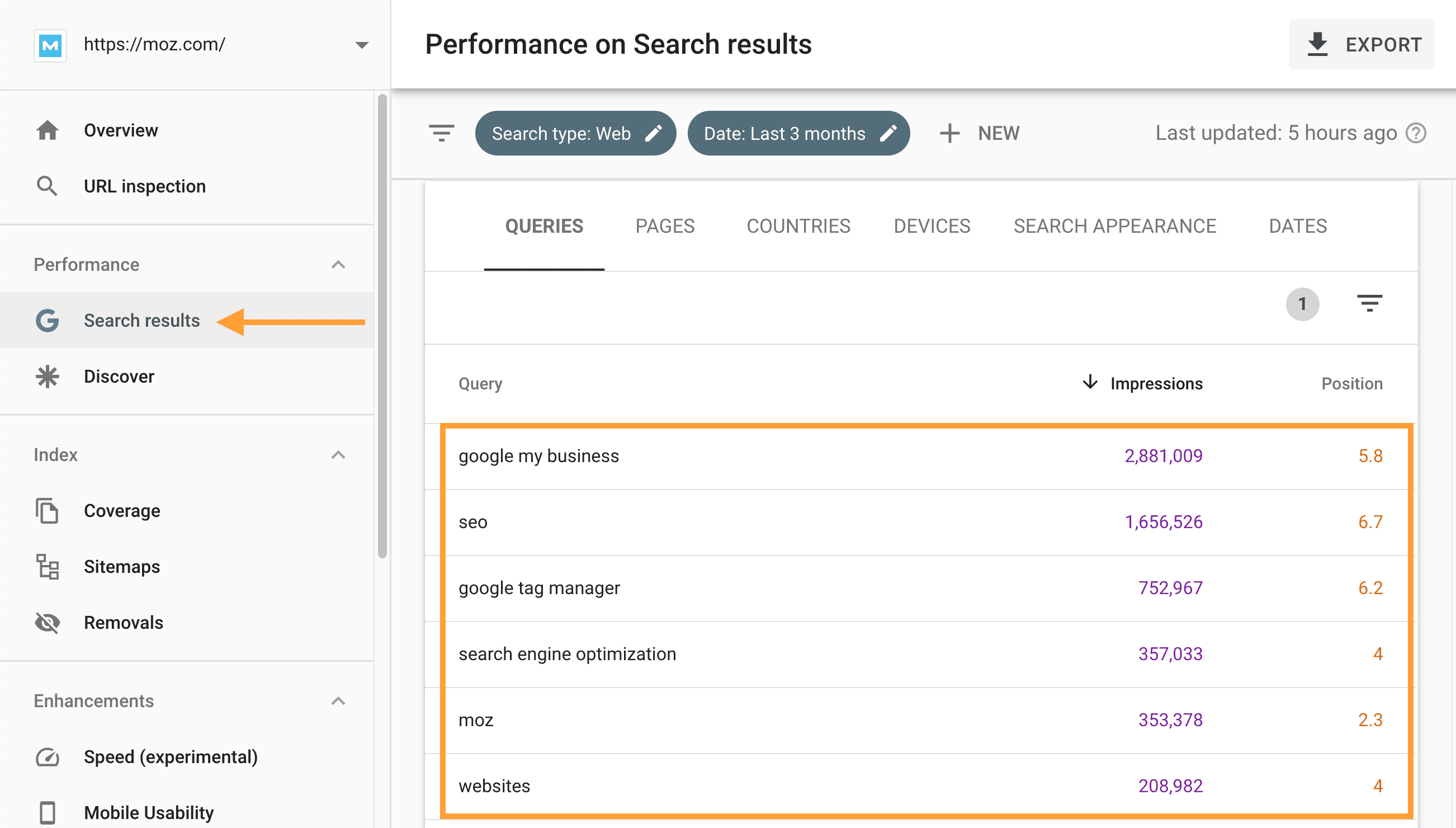
Pro tip: Filter for Positions 1-10 and sort by impressions to find your most valuable seed keywords.
3. Seed keywords from your competitors
You can also easily grab top-ranking seed keywords from your competitors.
There are two different sets of competitors you want to research:
- Your current, actual competitors
- Your desired, future competitors
In other words, we want to research competitors for 1) keywords we already rank for and 2) keywords we want to rank for in the future. (If you're a brand new site, or entering a new market, you might want to focus specifically on number two.)
You might think you know who your competitors are in search, but do you know exactly who competes for every keyword you rank for? Fortunately, there's an easy way to find out.
First, head to the free Domain SEO Analysis tool.
Simply enter your URL, scroll to the bottom, and see the true competitors that compete for the same keywords as your domain, ranked by visibility. Here are the top search competitors for Moz.
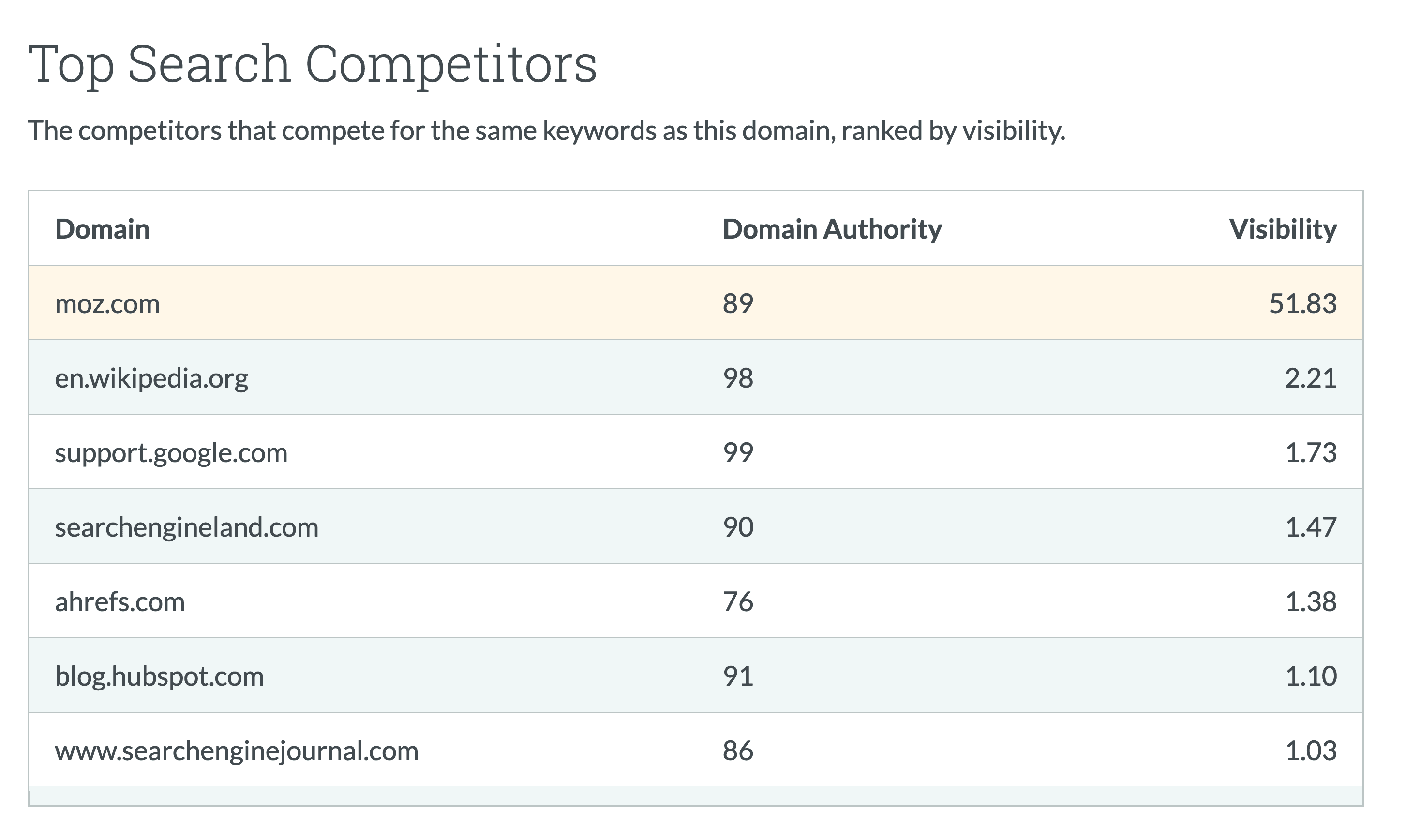
We want to pick out the competitors that cover similar topics as Moz, such as Ahrefs or Search Engine Land.
Next, simply enter these domains into Keyword Explorer (like you did earlier in step one) and find the top-ranking keyword opportunities for each site.
Seed keywords for new sites and topics
If you're planning content for a brand new website, or want to branch out into new topics on your website, then you'll be getting most of your data from third party sources.
Never fear — this is a terrific place to start.
The easiest first step when gathering seed keywords for a new topic is simply to Google the specific keyword phrases that you want to rank for. In this case, we'll search Google for "motorcycle repair manuals."
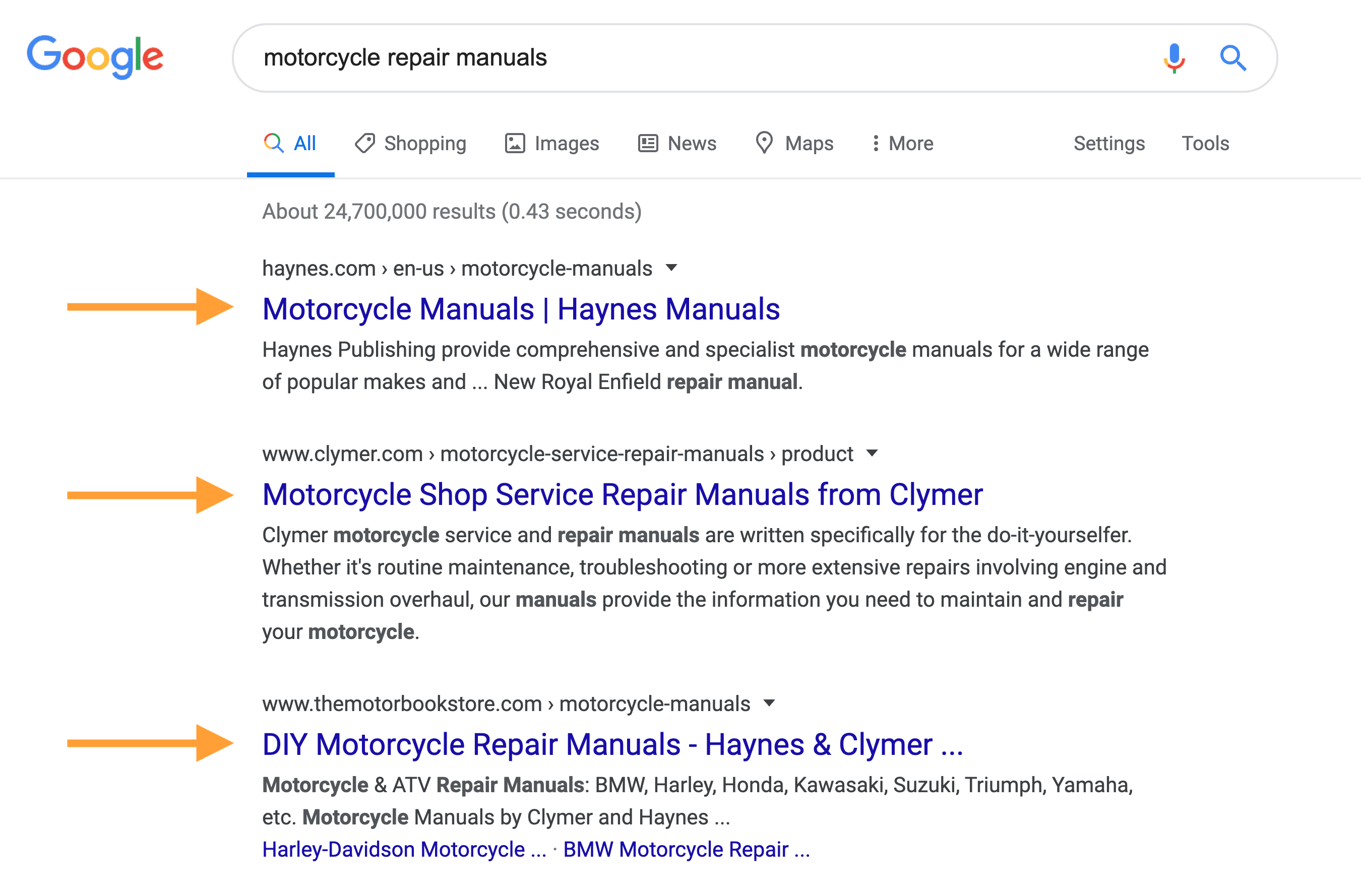
If you can, try to ignore large sites (like Amazon or Wikipedia) that rank for everything, and try to find sites that specifically focus on your keyword topic.
Next, we'll simply punch these sites into Keyword Explorer's "Ranking Keywords" report. This report shows you all the keyword phrases the site or page ranks for.
Try looking at metrics for both the "exact page" and "root domain" to find the most helpful keywords.
To get the most out of this report, it often helps to limit results to keywords ranking in the top 1-10, and to sort your keywords by volume (high to low).
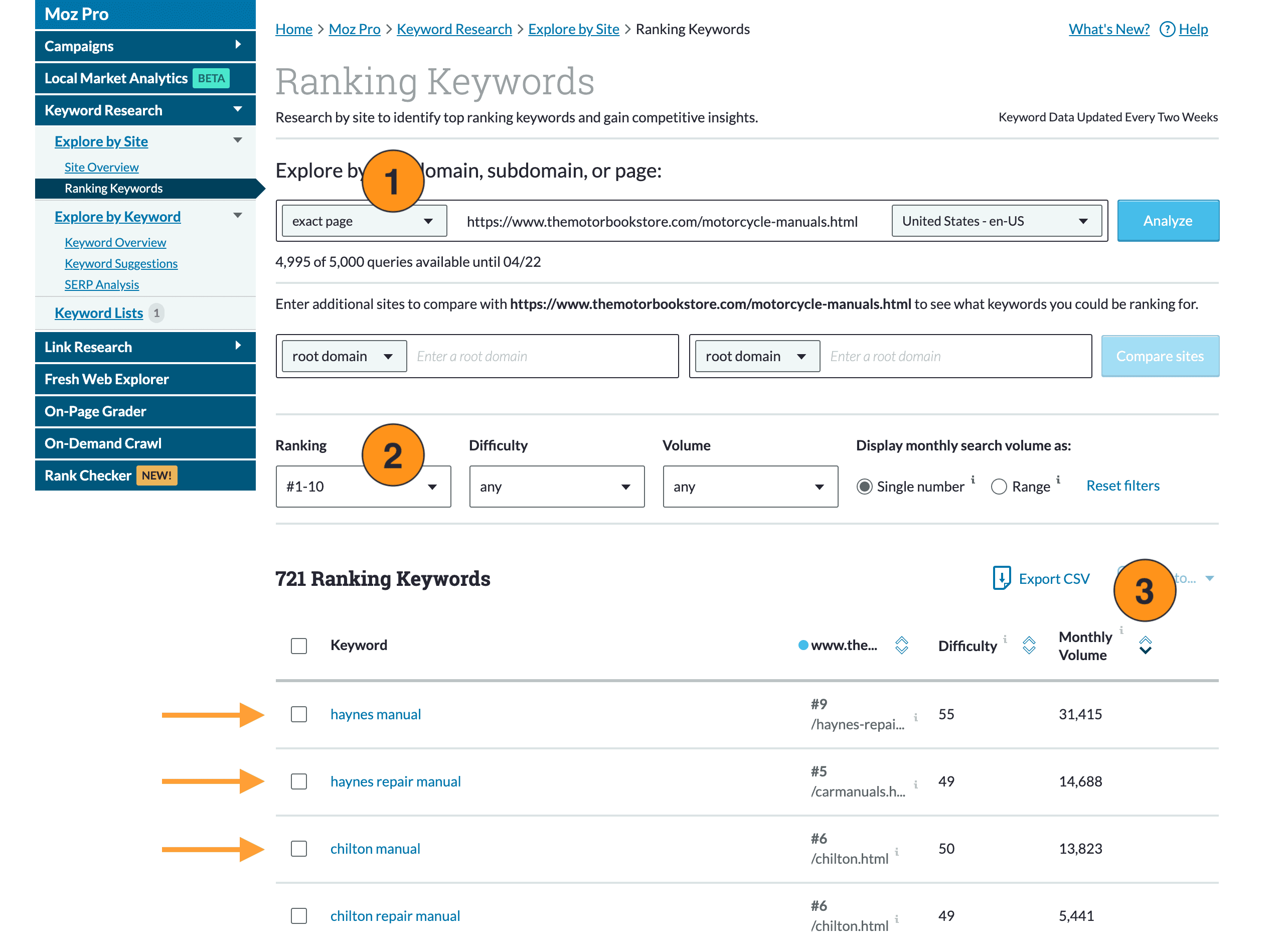
Using this technique, we start to find some amazing keywords we might not have thought of otherwise, such as:
- Haynes motorcycle manuals
- Motorcycle service manuals
- Shop manuals
- … and more
At this step, you'll typically want to ignore most site-branded terms. For example, if you were looking at "Moz" as a competitor, you likely don't want to try ranking for any branded keyword that contains "Moz."
Be sure to export your seed phrases or record them in a spreadsheet.
Additional tools to discover seed keywords
Seed keywords are everywhere. You often have to get creative to find them, but the better your initial seed keyword list, the better your final keyword strategy will be.
Here are a few terrific places to discover seed keywords.
1. Google related searches
Search any keyword phrase, scroll to the bottom, and Google will show you a list of related keyword phrases.
These are gold.
We also recommend this nifty Chrome extension to extract even more Google related searches.

2. People also ask
While these tend to be a bit more specific, you can also harvest seed keyword ideas from Google's "People also ask" boxes.
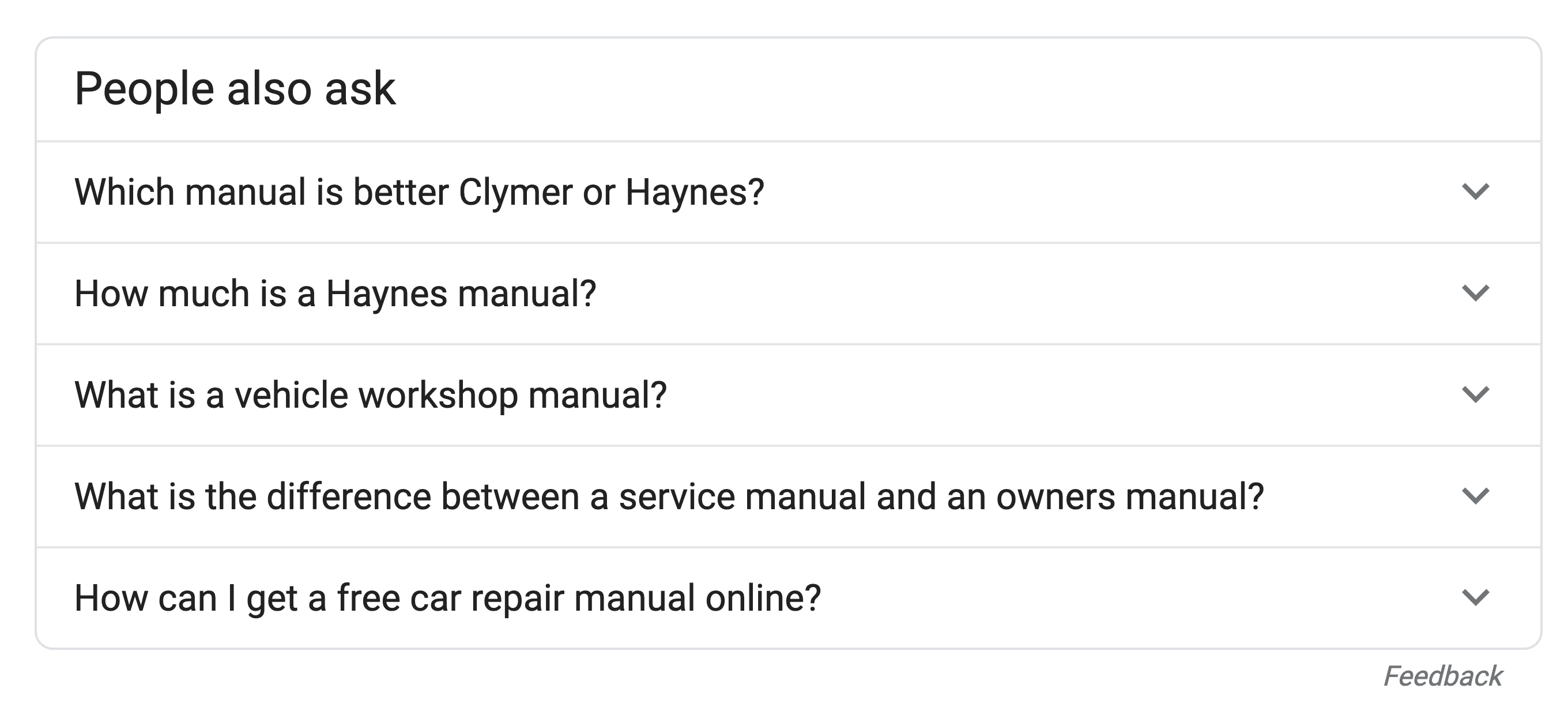
3. Google Keyword Planner
Google's own keyword tool for its profitable Adwords platform provides a wealth of keyword ideas.
One caveat: many of the metrics are geared towards paid search ads, and not extremely reliable for organic campaigns.
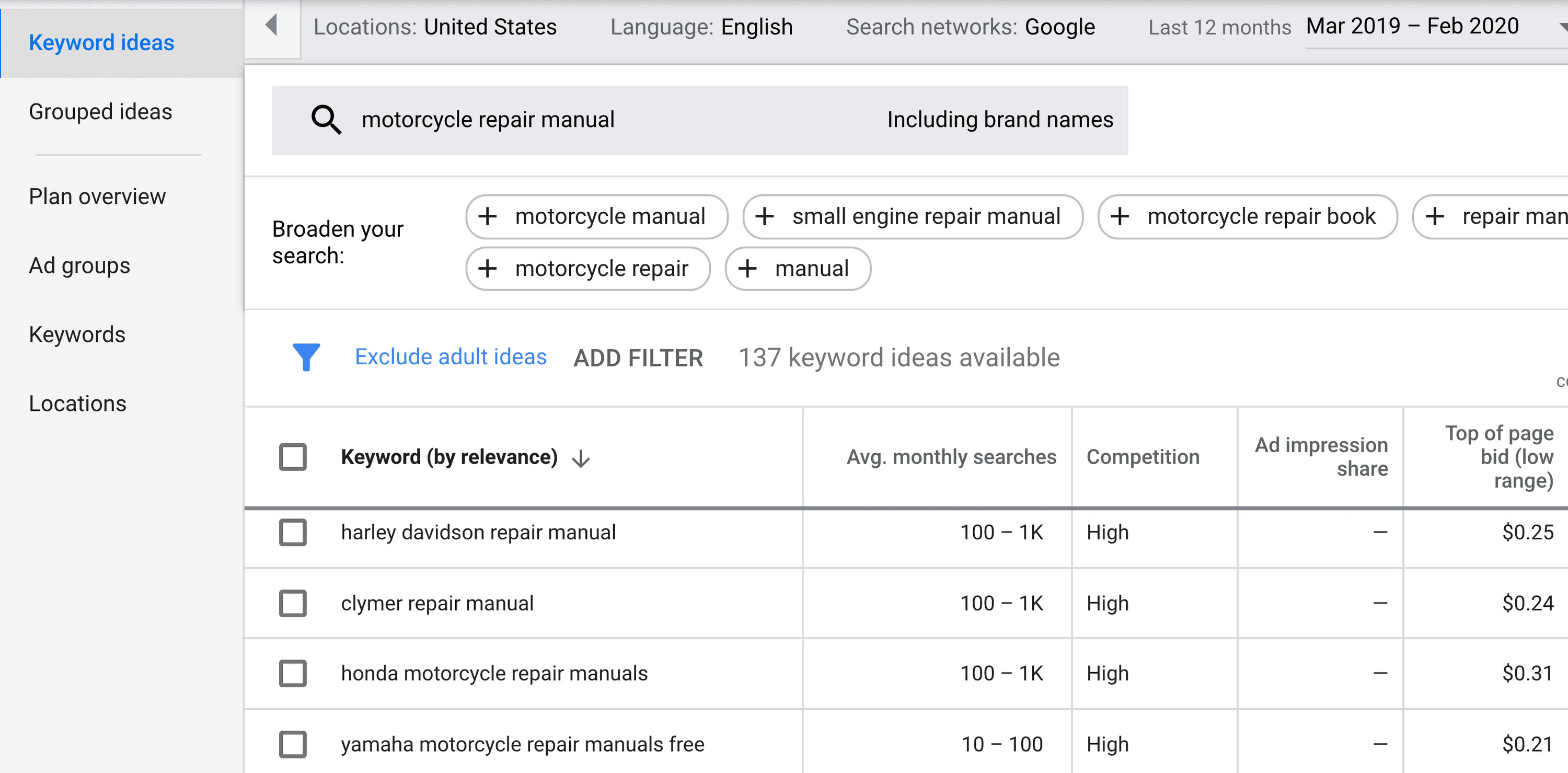
4. Answer the Public
The always popular Answer the Public is a favorite starting point for many keyword research projects. The free plan is so generous, we had to include it here.
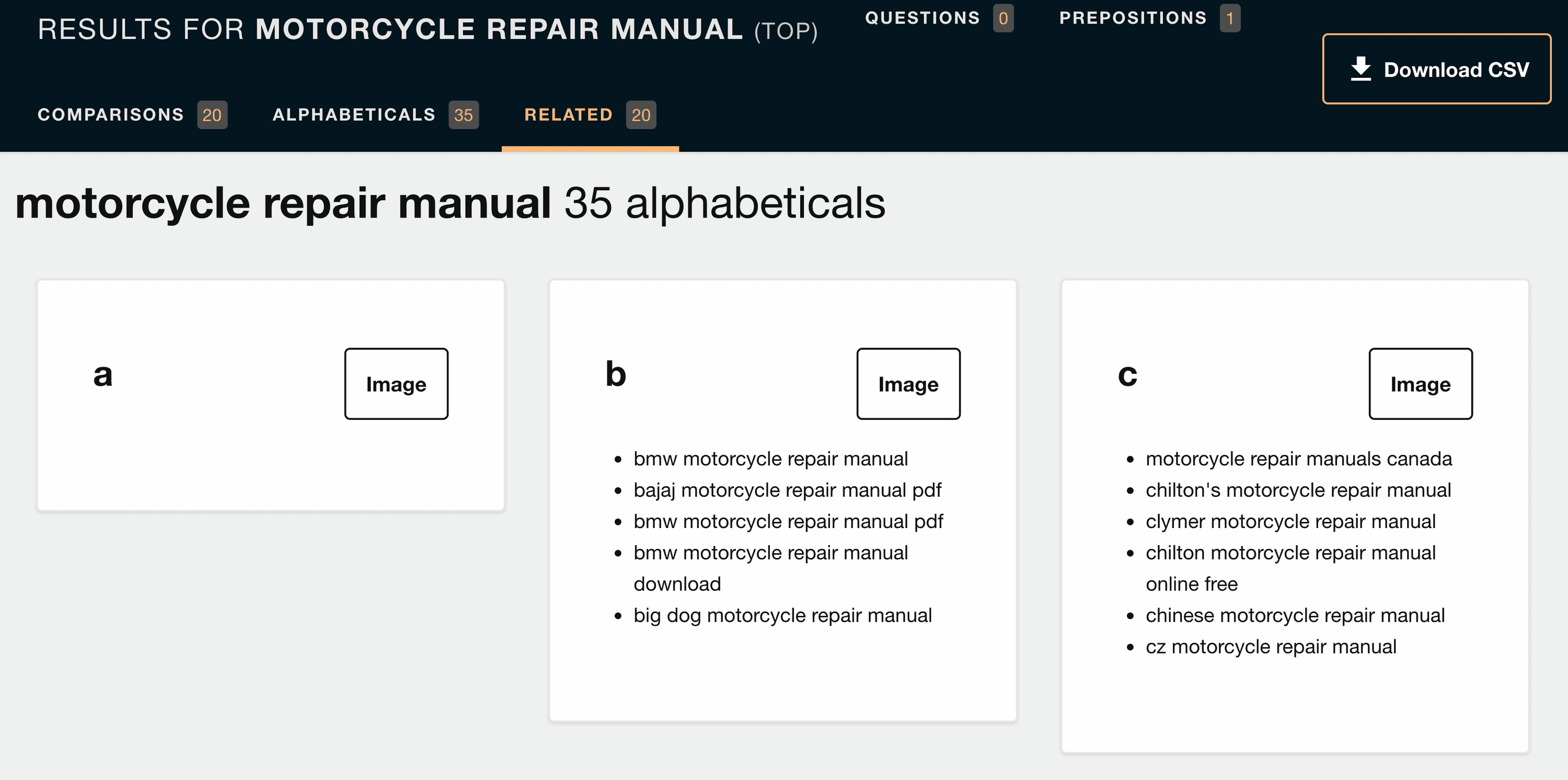
5. Google Trends
Another Google tool that provides interesting insights and related queries for any keyword, Google Trends will even show you historic keyword data and break interest down by geographic region.

Kane Jamison: Finding New Keyword Ideas

"Industry books and podcasts are both excellent places to find new topics that might not show up in traffic-based keyword research. Books tend to be good places to uncover high-level ideas and understand the structure across a large topic, and podcasts tend to be a good place to uncover topics that have little-to-no search volume, but are important to your audience."
Kane Jamison — Founder, Content Harmony
Using keyword difficulty to filter seed keywords
Invariably, when hunting for seed keywords, you're going to find a lot of VERY competitive keywords — keywords you may not be able to rank for.
To save time down the road, it's helpful to select seed keywords that fall within your site's keyword difficulty potential. This means you might actually have a shot at ranking.
To find your site's keyword difficulty potential, simply run a ranking keyword report for your domain. Use the following settings:
- Search using "Root Domain"
- Set "Ranking" to 1-3 (keywords you rank highly for)
- Set "Volume" to anything over zero (in this case, greater than 101 searches per month)
- Sort by "Difficulty" (high to low)
- Ignore any branded terms
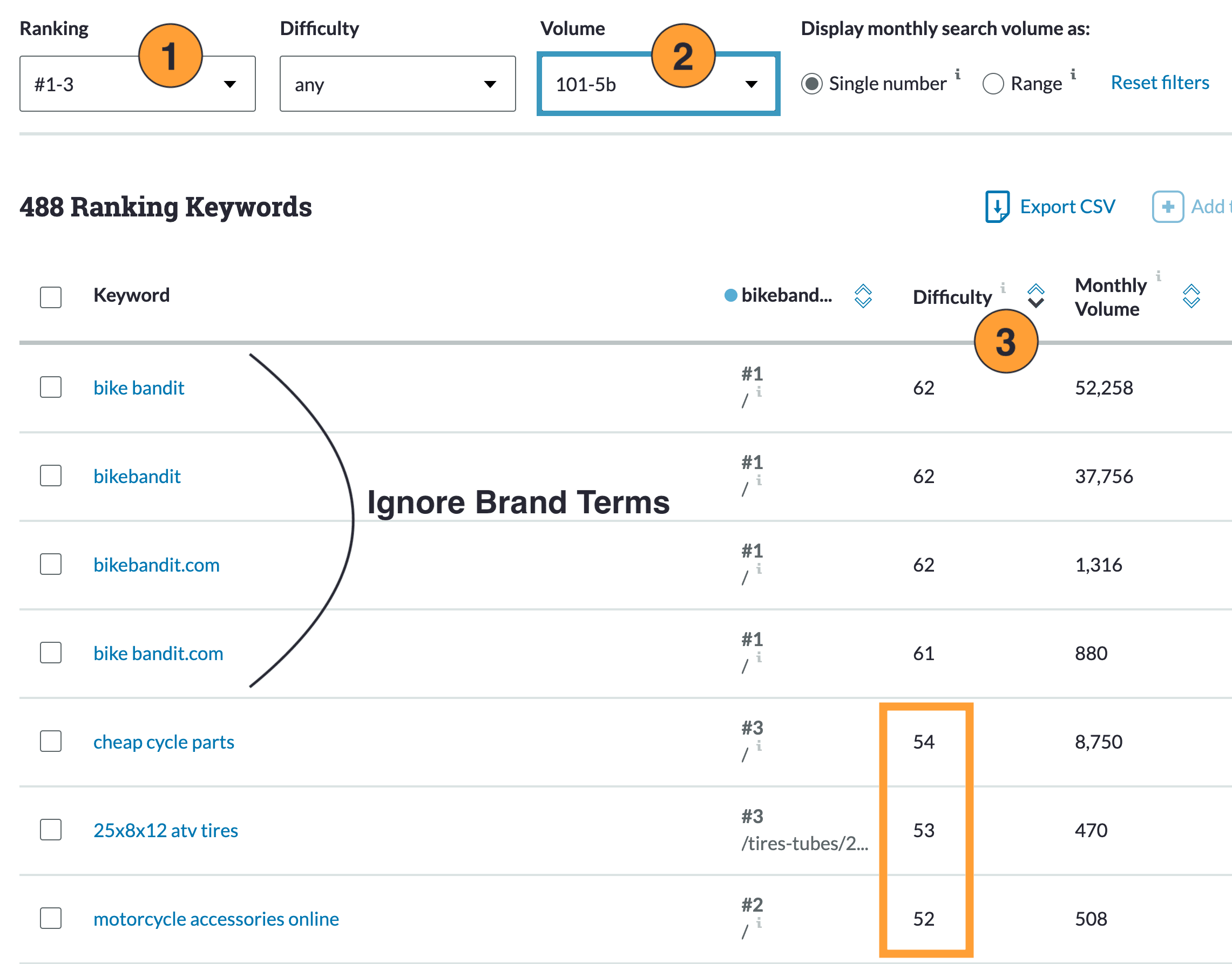
In this example, we can see that our highest ranking keyword difficulty score for semi-competitive keywords is 54 for "cheap cycle parts."
This means we might set our keyword difficulty potential between 45-55, meaning these are keywords we could potentially rank for. Any seed keywords that fall above this range we'd typically ignore.
How many seed keywords do you need?
At this point you should have a nice list of 5-50 seed keywords to work with, depending on how deep you want to go.
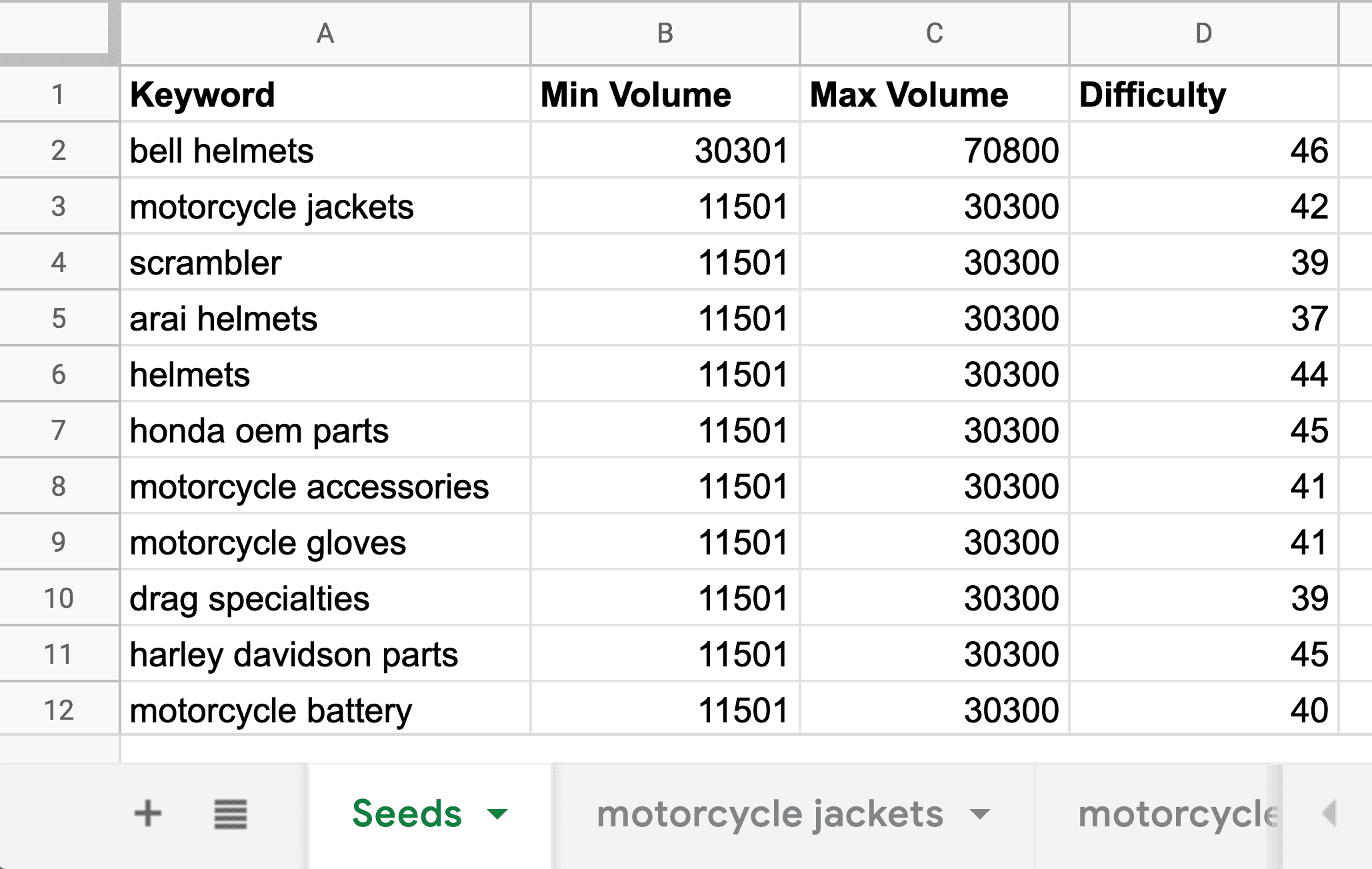
Your seed keyword list might look like the one above.
Don't worry if you don't have enough — you'll discover more as you work through the process.